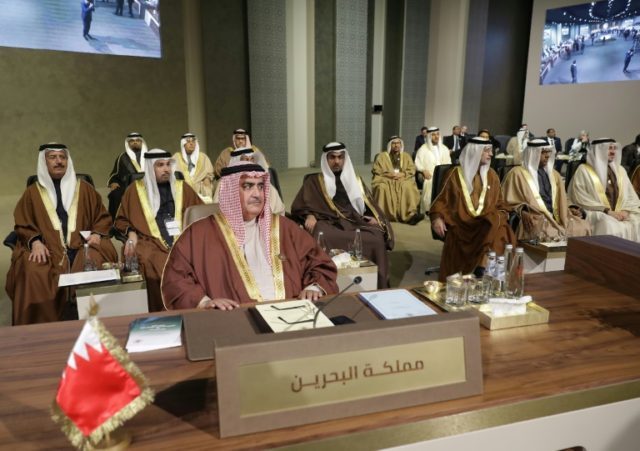TEL AVIV – Bahrain views Israel as a country that is here to stay and one it wishes to make peace with, the Gulf state’s foreign minister said Wednesday on the sidelines of the U.S.-led economic peace workshop.
Speaking to the Times of Israel, one of six Israeli media outlets granted an invitation to the Manama summit, Khalid bin Ahmed Al Khalifa said the “Peace to Prosperity” workshop was “very, very important.”
He added that the workshop, during which the Trump administration unrolled the economic portion of its long-anticipated peace proposal, could be a “gamechanger” in much the same way that former Egyptian president Anwar Sadat’s visit to Jerusalem in 1977 was a precursor to the Camp David Accords and the subsequent peace treaty between Israel and Egypt.
“As much as Camp David 1 was a major gamechanger, after the visit of President Sadat — if this succeeds, and we build on it, and it attracts attention and momentum, this would be the second gamechanger,” Khalifa said.
While he would not commit to endorsing normalized relations with Israel anytime soon, Khalifa emphasized that Manama recognizes Israel’s right to exist, the report stated.
“Israel is a country in the region … and it’s there to stay, of course,” he said.
“Who did we offer peace to [with] the [Arab] Peace Initiative? We offered it to a state named the State of Israel, in the region. We did not offer it to some faraway island or some faraway country,” Khalifa continued, referring to the 2002 Saudi-led proposal.
“We offered it to Israel. So we do believe that Israel is a country to stay, and we want better relations with it, and we want peace with it,” he said.
He continued by saying that while Bahrain is possibly the only Arab state, besides Egypt and Jordan, to publicly acknowledge Israel’s right to exist, “we know our brothers in the region do believe in it” also.
Khalifa said Israel’s rejection of the Arab Peace Initiative (API) is a “missed opportunity” and urged it to rethink its position.
Kushner this week denounced the notion that the U.S. peace proposal should adhere to the Saudi framework, saying, “If there ever is a deal, it’s not going to be along the lines of the Arab Peace Initiative.”
The API, initiated by Saudi Arabia, called for a Palestinian state along pre-1967 lines with a capital in eastern Jerusalem and a settlement of the so-called “right of return” for Palestinian “refugees.” The latter has been rejected outright by Israel, which views the return of Palestinians to their ancestral homes in Israel proper as spelling the end of the Jewish state by demographic means.
In return for a full withdrawal from eastern Jerusalem, the Golan Heights and the West Bank, the Arab world would normalize relations with Israel, according to the plan. This would theoretically mean an Israeli withdrawal from the Jewish Quarter of Jerusalem’s Old City, the Western Wall and Temple Mount.
Khalifa urged Israelis to discuss the issues they have with the API with Arab leaders.
“Come and talk to us. Talk to us about it. Say, guys, you have a good initiative, but we have one thing that worries us,” he said.
Addressing the rest of the Trump administration’s peace proposal, Khalifa said he was optimistic.
“We have to wait. I cannot talk about something that I don’t know. But we hope that this political plan will also be attractive to everybody,” he said. “Look at the workshop. It’s very attractive. You don’t want to give an attractive offer and then come and bring something that could stall it. We want to see it continue on the same momentum. So we’ll see it.”
Speaking Wednesday at the conference, US Treasury Secretary Steve Mnuchin urged the international community to adopt the economic framework.
“This is a regional economic plan. Although Gaza and the West Bank are a major focus of this plan, it also includes Jordan, Egypt and Lebanon. … It is very important that we focus on these economies as a whole,” he said.
“Most importantly, we want an international consensus. … We want this to become not a United States plan, we want this to become an international plan. Now that the plan is out there, we’re looking for changes, we’re looking for additions, we’re looking for buy-in, and really as a next step that this becomes a collective” plan, added Mnuchin.
Mnuchin said: “This is a plan that can very much be accomplished.”
“I know there is a lot of money in this room,” he quipped.

COMMENTS
Please let us know if you're having issues with commenting.